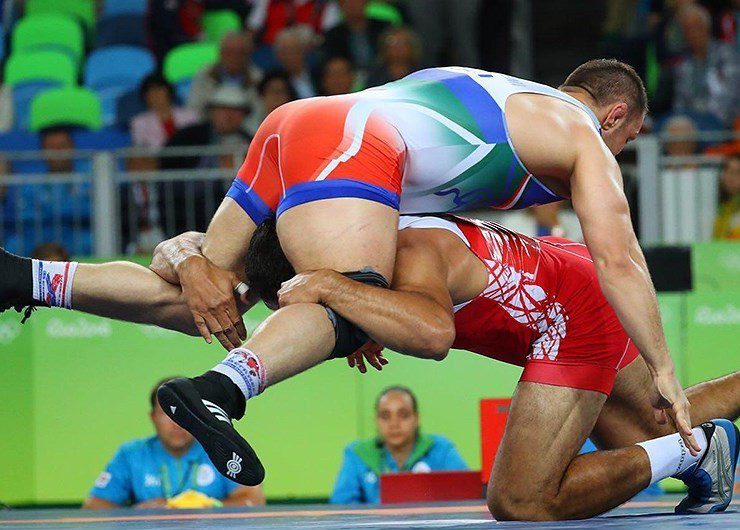The Olympic Games are in full swing, and that means an inescapable parade of some of the most beautifully athletic bodies in the world. If you struggle with your body image, the steady stream of fitness inspiration can also be a devastating torrent of I don’t measure up.
What do you with that?
#1 You’re not alone.
Ironically, something that makes sports valuable is their ability to affirm the wonderful goodness of different body types. Which is another way of saying that many of those elite athletes you are watching this summer found their hope when they stumbled onto a sport perfectly made for a body that had felt too big-small-short-tall-weird until the day they finally found their thing.
Even people who have literal gold medals in my body is awesome can struggle with body image disorders.
So if you are feeling like you aren’t fit enough, slim enough, strong enough, wrong size, wrong age, wrong abilities, wrong amount of beautiful . . . you’ve got a lot of company. It happens.
#2 Get back in touch with your support team.
If you’ve been in treatment for an eating disorder, history of performance-enhancing drug abuse, depression or anxiety related to body image, recovery from abuse or sexual assault that affected your sense of self worth . . . it’s probably time to fit in an extra appointment with a therapist you’ve found helpful.
If you’ve got a self-help book that helps you get your mind on straight about your true worth and the dignity and preciousness of the body that you have, consider giving it a re-read.
If you have a supportive friend who understands what you are going through and is genuinely helpful, reach out and take some time to sympathize with and encourage one another.
#3 Step back from the triggers.
One of the troubles with trying to be as healthy as you can be is that the leading advice often comes from people who are unusually fit, attractive, and successful. That’s why they have the best-selling book, podcast, YouTube channel, high-flying career, and so forth.
Furthermore, through the eyes of body-image disorder, it’s easy to see only the most impressive features of each talking head, and fail to remember that there are certain areas of life where actually you’ve done pretty well under the circumstances, and frankly these stars should be asking you for advice.
It’s okay to take a break from all that. Even if usually listening to a steady stream of health and fitness inspiration helps keep you motivated to take good care of yourself, you may need to change your mindfeed when you are in a body-image downward spiral.
Suggestion: Is there a way you can do something positive and mutually-helpful for regular people in your community?
That could be something physical (help a neighbor with yardwork?), something social (write, phone, or text a kind, friendly person who doesn’t get a lot of company?), or something practical like decluttering and donating some of your good-but-unneeded stuff to charity.
The idea is to get out of your toxic headspace and put your energy towards something that is genuinely good for you . . . but that puts you in touch with normal people.
#4 Be honest about what you truly control.
One of the fuels of body image disorders is the idea that if we only completed xyz list of self-improvement tasks, then we, too, could be as beautiful-slender-strong-wealthy-talented-successful as that person over there.
Okay, what makes you think that?
Well if I didn’t binge eat . . . yes, true. Have you figured out what is triggering your binge-eating, and begun addressing the underlying illnesses, addictions, or toxic relationships (past or present)?
Well if I ate a healthier diet . . . some truth in that, too. Have you figured out what is a healthy diet for you? Because not all bodies respond to all foods in the same way. Have you identified any underlying illnesses that might be affecting how your body metabolizes food? All of them?
Well if I exercised more . . . maybe so. How much more exercise can you actually do? There are limits on your free time, on your physical capacity, and on your activity budget. You have responsibilities. And are you being honest about your individual body’s ability to perform like that athlete over there?
By all means, if there are healthy changes you need to make to in your life, treat yourself with the kindness you deserve and start carving out space in your life for those changes. I’m 100% in the camp of encouraging you to be as healthy as you can be, even if that amount will never impress anybody.
But also you deserve some acknowledgement and respect for the fact that you’ve been making do under some extenuating circumstances. No matter how many advertisers swear you just need to follow your dreams and want it badly enough, actually human frailty is real and we can’t always have everything we fantasize about.
#5 Wear clothes that fit you!
If your size tends to fluctuate, you might be going around in clothes that are too baggy, too tight, or, weirdly, a little of both. Body image disorder tells you all kinds of lies, and one of them is that for some reason you’re supposed to wear the clothes that don’t fit.
Ignore the lie. You don’t need a lot of clothes, you don’t need expensive clothes, but you are worthy of treating yourself with respect, and that means wearing your current size, not your fantasy size. You will look better and feel better if you do so.
If you are prone to fluctuations in body size beyond your complete control, save yourself some basics in your other sizes!
Maybe you won’t have to open the Box of Dread ever again, thanks to that new meal and exercise plan, but again, be honest, my goodness if you really do have a health situation that causes your size to wander, there’s no need to add to your misery. Invest in size-flexible accessories you truly love and make you feel spiffy, and then keep basic neutrals in your ups-and-downs for core wardrobe necessities.
#6 Give thanks in everything.
Body image disorder tends to bring along a pile of negativity for company. There’s a real tension between gratitude for the body that you have and reckoning with any self-sabotaging behaviors that you need to acknowledge and change.
The prayer I’ve been working from when the negative thoughts creep in is short and simple: “Thank you Lord for this beautiful body, and please help me take good care of it.”
You can pray it for yourself, you can pray it for loved ones, and you can pray it for total strangers.
Your body — every body — is magnificent.
Maybe some of that magnificence isn’t on full display at the moment. Maybe some of that magnificence is the hidden work of how your body, and your life circumstances generally, put pressure you on to grow your soul in new and often difficult ways. Ultimately you won’t see the fullness of the glory of creation that is you until you enter into eternity.
Meanwhile, do your best to love and cherish the body you’ve got.
Photo: Men’s Olympic wrestling, 2016, courtesy of Tasnim News Agency, CC 4.0



















